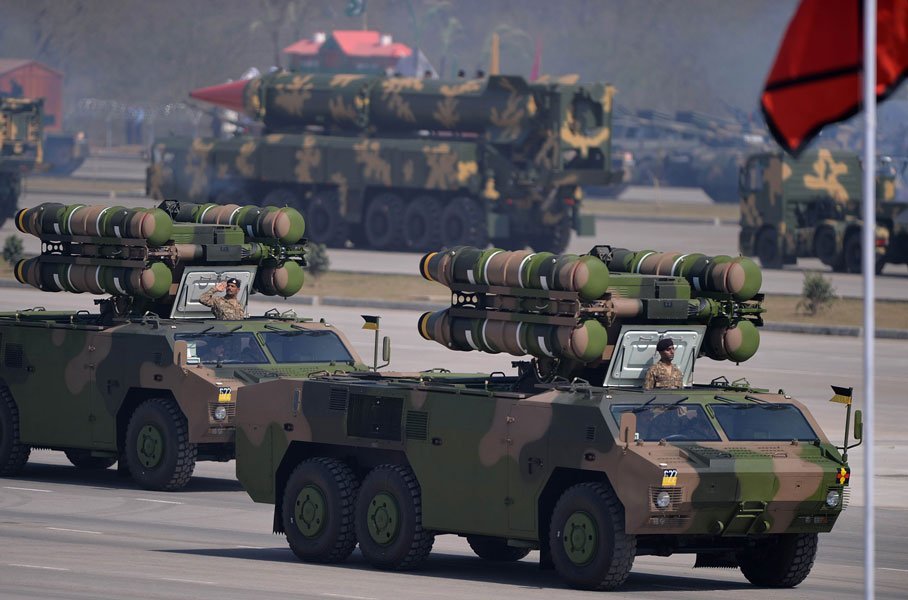The survival of any nation largely depends on its defense capability and there is no exemption to this fact even in the modern sophisticated world. Unassailable defense has always been a dream of mankind throughout history. History remembers that nations that successfully defended their territorial integrity not only against external threats but also effectively controlled internally emerging perils. Though developed civilization always promoted winning the hearts and minds of the public over coercion, the notion that “might is right” still leads the world in one or the other way, either militarily or economically.
The existential threat may not be an issue for many nations in the modern world, but they’re always chances of internal disorder and foreign-backed anarchy. Nations unable to control the internal chaos and militancy lose their position and value in the international community. Sudan, Somalia, Syria, and Libya are some examples. Weak nations always have to please the intimidating nations having military might, especially in the immediate neighborhoods.
South Asia has always been in the focus of superpowers throughout history being a crossroad to energy-rich Central Asia, they always tried to either conquer this region or keep it under strict control using every tactic. This wrangling of titans always keeps the region unstable. US troops with coalition forces have recently withdrawn from Afghanistan after 20 years.
On the other hand, Hindutva followers are ruling India and they have ambitions to enjoy hegemony in the region and keep all others under their thumb. This ruthless pursuance of regional dominion is the impetus for arms buildup by India always results in an imbalance of power in the region and other nations in the region always remain striving for maintaining the balance.
Pakistan is always seen as an interruption by India in its dream of supremacy in South Asia, hence feels most insecure in its continuous arms stockpile policy of India. Pakistan’s caution is valid keeping in view the three wars already fought between both countries and the unresolved Kashmir issue. Hence, maintaining the balance of power becomes imperious for Pakistan. However, the economic crunches always become a strain in this scenario and Pakistan spends relatively quite less on defense as compared to archrival India.
The armed forces of Pakistan have to maintain their might against external as well as internal threats in the meager resources. Acquiring up-to-date sophisticated technology is not possible in the continuous economically risky milieu of the country. Keeping the military capacity intact in the paltry resources becomes pretty tough. There are often voices against the large chunk of the defense budget in the country as compared to spending on development and education. There is no doubt about this aspect, but security becomes the first and foremost concern for anyone. There can be no compromise to the emanating existential threats external or internal.
In this volatile security situation of the region and continuous stemming threats, the Armed Forces of Pakistan are spending fairly less amount and maintaining all their activities including training and operations meticulously. At a time when the Pakistani government is trying its best to mollify the economic challenges, Armed Forces also have adopted austerity measures to shoulder the government efforts which is a very positive gesture. There is also news that defense forces didn’t ask for any increase in the annual budget keeping in view the economic crisis country is facing at present without an IMF deal.
In budget 2022-203, Rupees 1523 was allocated for defense which is merely 16.02% of the total budget. In the finance bill 2021-22, the defense allocation was 1370 billion rupees out of a total budget worth 8487 billion rupees which were also 16.14%, which means no increase in the defense budget. In the given scenario of a regional security environment, the training, military equipment purchasing & maintenance, and the ongoing operations in different parts of the country, the 16% share of the budget is fairly justified. The situation in the region improves, and external and internal threats diminish with the passage of time, these resources can be readjusted towards development and social wellbeing. Outcries for less spending on development and education are valid indeed if there are no security threats, but everything else can be achieved in a peaceful environment, free of terrorism and external interferences.
Compared globally, Pakistan spends merely $40 on a per capita basis and only $ 13400 on per more solid basis as compared to immediate neighbor Iran which spends $ 2300 on a more solid basis. Comparison with other countries of the world with better economies is unjustified. The economic situation in Iran is also well known by all of us. Besides, a lot of resources of the armed forces also go to helping the nation amidst calamities as a civilian institution in the country lack capacity to effectively work in such catastrophes.
Constructive criticism is valid if facts & figures and the regional, as well as internal security scenario, are kept in view. Criticism sans facts for political gains or any other purpose should be avoided to keep the morale of soldiers intact who are rendering sacrifices for the motherland day and night.
